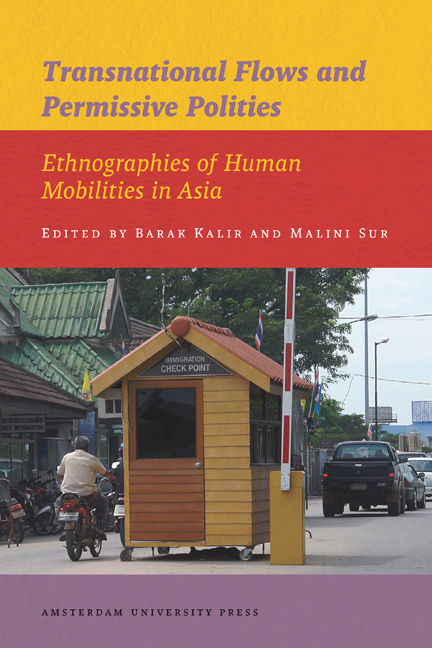Book contents
- Frontmatter
- Contents
- List of Tables, Maps, Figures and Photographs
- Acknowledgements
- Introduction: Mobile Practices and Regimes of Permissiveness
- 1 Illegality Rules: Chinese Migrant Workers Caught up in the Illegal but Licit Operations of Labour Migration Regimes
- 2 Contesting the State of Exception in the Afghan-Pakistani Marchlands
- 3 ‘Looking for a Life’: Rohingya Refugee Migration in the Post-Imperial Age
- 4 Smuggling Cultures in the Indonesia-Singapore Borderlands
- 5 Trade, Transnationalism and Ethnic Infighting: Borders of Authority in Northeast Borneo
- 6 Bamboo Baskets and Barricades: Gendered Landscapes at the India-Bangladesh Border
- 7 Moving between Kerala and Dubai: Women Domestic Workers, State Actors and the Misrecognition of Problems
- 8 Emigration of Female Domestic Workers from Kerala: Gender, State Policy and the Politics of Movement
- 9 Mainland Chinese Migrants in Taiwan, 1895-1945: The Drawbacks of Being Legal
- 10 ‘Playing Edge Ball’: Transnational Migration Brokerage in China
- Epilogue: Irregular Mobilities and Disjunctive Moralities
- About the Editors and Contributors
- Bibliography
- Index
- Publications Series
Introduction: Mobile Practices and Regimes of Permissiveness
Published online by Cambridge University Press: 15 January 2021
- Frontmatter
- Contents
- List of Tables, Maps, Figures and Photographs
- Acknowledgements
- Introduction: Mobile Practices and Regimes of Permissiveness
- 1 Illegality Rules: Chinese Migrant Workers Caught up in the Illegal but Licit Operations of Labour Migration Regimes
- 2 Contesting the State of Exception in the Afghan-Pakistani Marchlands
- 3 ‘Looking for a Life’: Rohingya Refugee Migration in the Post-Imperial Age
- 4 Smuggling Cultures in the Indonesia-Singapore Borderlands
- 5 Trade, Transnationalism and Ethnic Infighting: Borders of Authority in Northeast Borneo
- 6 Bamboo Baskets and Barricades: Gendered Landscapes at the India-Bangladesh Border
- 7 Moving between Kerala and Dubai: Women Domestic Workers, State Actors and the Misrecognition of Problems
- 8 Emigration of Female Domestic Workers from Kerala: Gender, State Policy and the Politics of Movement
- 9 Mainland Chinese Migrants in Taiwan, 1895-1945: The Drawbacks of Being Legal
- 10 ‘Playing Edge Ball’: Transnational Migration Brokerage in China
- Epilogue: Irregular Mobilities and Disjunctive Moralities
- About the Editors and Contributors
- Bibliography
- Index
- Publications Series
Summary
This is a book about transnational mobile practices. The contributors share a common concern: to push social analysis beyond received notions of legality and illegality and to think outside the box of state authority versus criminal behaviour. In doing so, we join a growing group of social scientists searching for new ways to understand the relationship between human behaviour and multiple authorities. For us, simple dichotomies will not do; instead, we seek a more finely grained framework of interpretion. The chapters that follow contain new ideas, based on close empirical observation in various societies across the vast continent of Asia.
Thinking Mobile
Two critical points of departure shape our approach. First, we consider mobility to be an integral part of social life rather than its exception (Urry 2007). Second, we acknowledge that the existence of mobile communities preceded the formation of states (Ludden 2003). Thus, we think of the state as a political organisation keen to regulate existing or emergent patterns of mobility. States are of interest to us because they exert themselves in controlling and moulding mobilities within and across their national borders. Our contributions empirically explore the effects of such exertions. How do they affect, contain, increase, deflect or bypass mobile practices?
From this perspective, the state often appears as reactive rather than proactive: it has to run after the facts. In doing so, it is never a neatly coordinated machine with all its agents acting in unison. The real-life states that we have studied bear little resemblance to the ‘model state’ used in much social theory. Looked at from the vantage point of people participating in (illegal) transnational flows, these states turn out to be far less tightly structured and much less governed by uniform, impersonal rules. Our studies demonstrate that these states suffer from a persistent ‘implementation deficiency’ – an inability to put their policies into practice. There are two dimensions to this. On the one hand, policies are often overambitious and the state lacks the manpower and legitimacy to push them through. On the other hand, officials may actively obstruct policies handed down from higher levels within the state.
- Type
- Chapter
- Information
- Transnational Flows and Permissive PolitiesEthnographies of Human Mobilities in Asia, pp. 11 - 26Publisher: Amsterdam University PressPrint publication year: 2012



